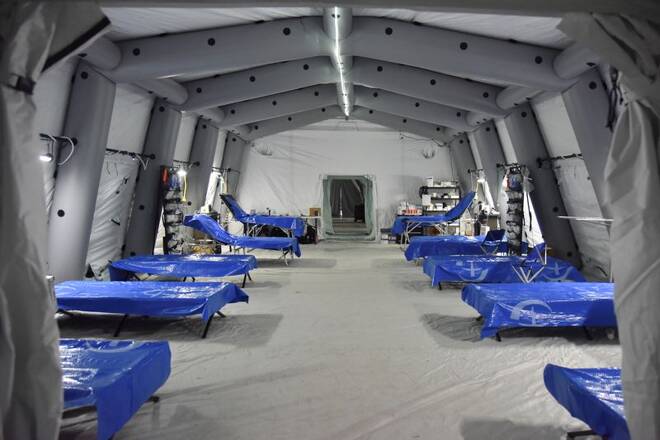Advertisement
Advertisement
WHO raises alarm about ‘healthcare on a knife-edge’ in Ukraine
By:
By Natalia Zinets KYIV (Reuters) - The World Health Organization's Europe chief sounded the alarm on Tuesday about healthcare provision in Ukraine during the war with Russia and called for an investigation into more than 200 attacks on the healthcare system.
By Natalia Zinets
KYIV (Reuters) – The World Health Organization’s Europe chief sounded the alarm on Tuesday about healthcare provision in Ukraine during the war with Russia and called for an investigation into more than 200 attacks on the healthcare system.
Hans Kluge, WHO Regional Director for Europe, said every third patient had problems with access to medicines, one in five in the conflict zone needed psychological help, sexual violence was on the rise and there was a risk of cholera outbreaks.
“As of today, WHO has verified 226 attacks on healthcare in Ukraine. That is almost three attacks per day since the 24th of February. They have left at least 75 people dead and 59 injured,” Kluge told a news conference in Kyiv.
Describing a situation where such attacks can be carried out with impunity as an insult to the dedication and integrity of health workers, he said: “These attacks are not justifiable, they are never OK, and they must be investigated.”
“No health professional should have to deliver healthcare on a knife-edge,” Kluge added.
Russia has denied targeting civilians in what it calls a special military operation in Ukraine.
Jarno Habicht, WHO Representative in Ukraine, said primary care facilities, hospitals and ambulances had been damaged in attacks since Russia invaded on Feb. 24.
Habicht said an additional concern was the COVID-19 pandemic which he said was not over in Ukraine. He praised the country’s COVID vaccination programme but said its scale should be increased and the detection system strengthened.
WHO’s Ukraine Incident Manager, Dorit Nitzan, said the southern city of Mariupol, which is now controlled by Russian forces after weeks of siege and heavy bombardment, was among occupied areas where there was a risk of cholera.
(Reporting by Natalia Zinets, Writing by Timothy Heritage, Editing by Ed Osmond)
About the Author
Reuterscontributor
Reuters, the news and media division of Thomson Reuters, is the world’s largest international multimedia news provider reaching more than one billion people every day. Reuters provides trusted business, financial, national, and international news to professionals via Thomson Reuters desktops, the world's media organizations, and directly to consumers at Reuters.com and via Reuters TV. Learn more about Thomson Reuters products:
Did you find this article useful?
Latest news and analysis
Advertisement
